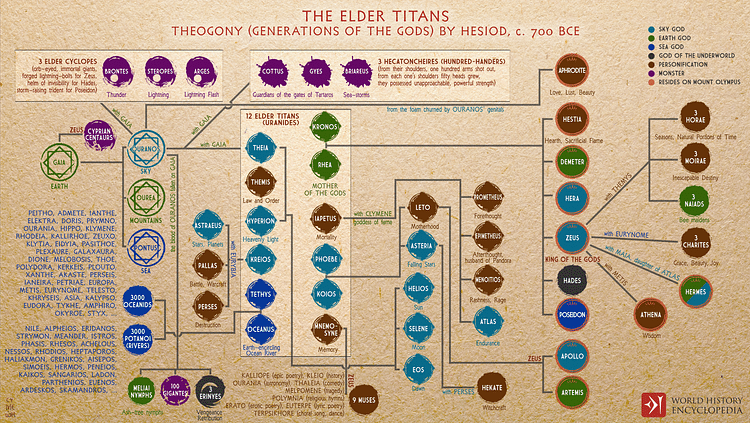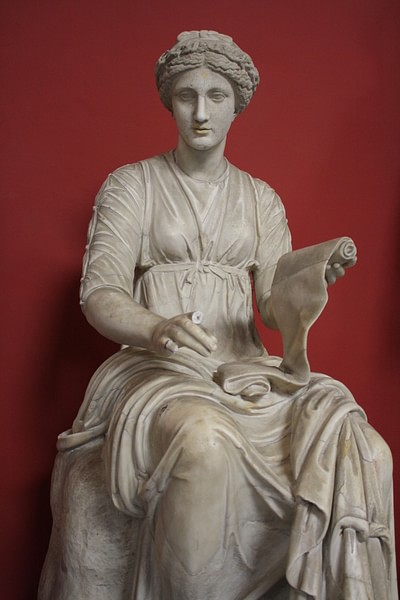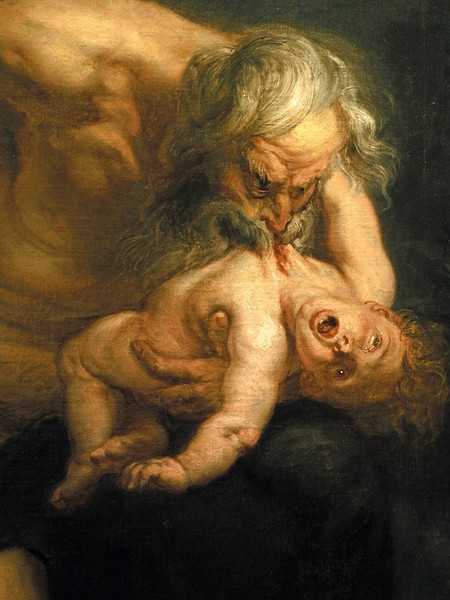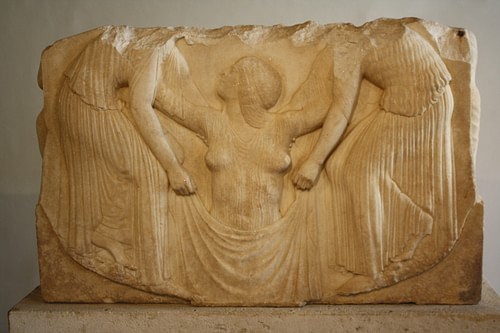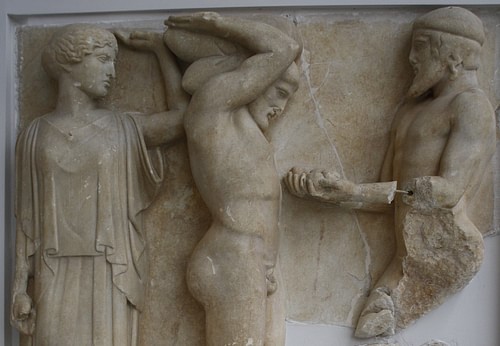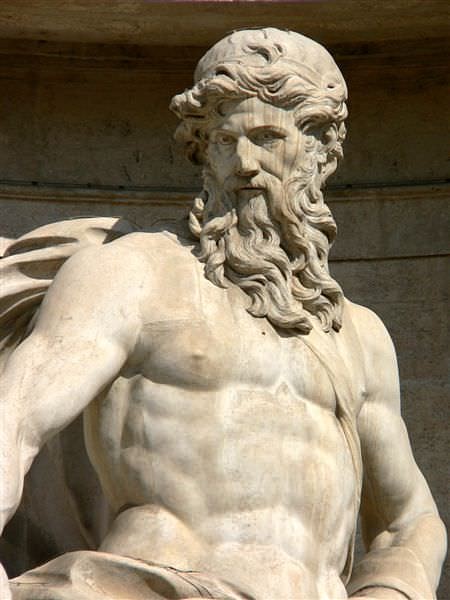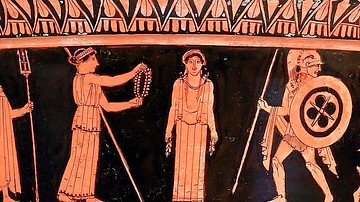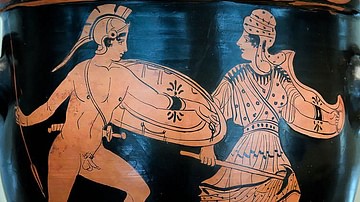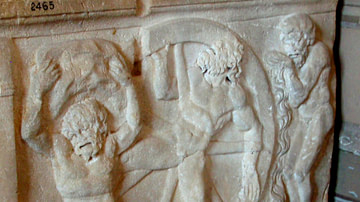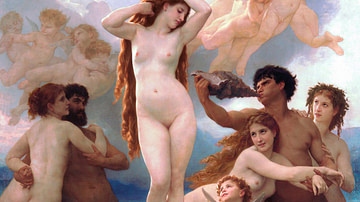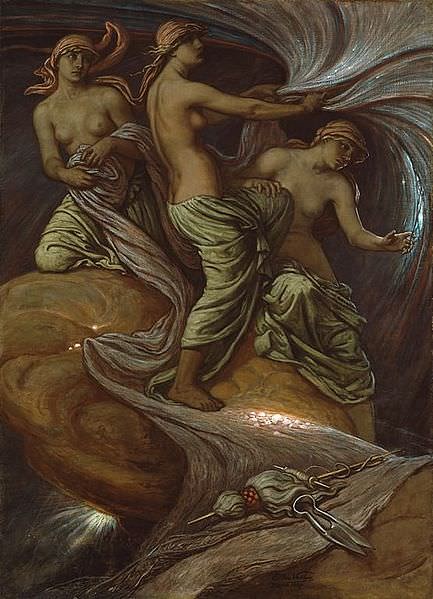
The Theogony is an 8th-century BCE didactic and instructional poem, credited to the Greek poet Hesiod. The Theogony was, at first, not actually written down, rather, it was part of a rich oral tradition which only achieved written form decades later. The Theogony traces the history of the world from its creation through the battle between the Olympians and the Titans to the ascension of Zeus as the absolute ruler of all of the Olympian gods. With the rise of Zeus to supremacy and the birth of his many children, the poem ends and does not address the continued struggles between mankind and the gods. Much of what is known today concerning early Greek mythology comes from Hesiod's work and that other great Greek poet Homer. Collectively, their works would serve as a major influence on later Greek literature and drama, and Roman mythology, especially through the epic Metamorphoses by Ovid.
Authorship
The Theogony (from the Greek theogonia, meaning "generations of the gods") is an epic poem of 1,022 hexameter lines which describes the birth of the gods in the Greek pantheon. It is thought to have been composed c. 700 BCE (give or take a generation either side of that date). Little is known of Hesiod's life. His father emigrated from Cyme in Asia Minor and settled in Boeotia, a small state in central Greece. It is assumed that the poet was a farmer; a fact garnered from the early verses of the Theogony. He may also have been a rhapsodist, a reciter of poetry, where he learned the technique and vocabulary of heroic songs.
Although there are some who question whether or not Hesiod actually wrote the Theogony, most classicists believe he did. However, parts of the work may have been added by later poets and there is a definite similarity in some aspects to earlier Mesopotamian literature. The historian Dorothea Wender believes that the Theogony was an earlier work than Works and Days, the other work attributed to Hesiod. She considers the latter to be a better work, and while the Theogony seems to be unpolished, the author could have had difficulty with written composition.
Wender criticizes Hesiod for not discussing the dethroning of Kronos and his endless mention of "colourless deities." Also, Hesiod's Zeus is too invincible. There is no suspense. "Homer gets more excitement out of a footrace than Hesiod does out of a full-scale war in heaven" (18). However, to Wender, the poem still has historical interest. Certainly, the Theogony was influential; the historian Norman Cantor in his Antiquity wrote that the Greeks adopted Homer and Hesiod's notion of the gods and
a distinctive Greek religion was developed. This religion was always complex and never consistent in all its details; still, its view of man and the world lies at the center of Greek culture. (123)
Hesiod was influential on Classical Greek literature and philosophy, his Prometheus story, for example, inspiring such playwrights as Aeschylus (c. 525 - c. 456 BCE). His poetic style was much imitated, particularly in Hellenistic times and in Roman times - both the Republic and Imperial Rome - when Hesiod's works continued to be recited and set to music. The great Roman writer Ovid (43 BCE - 17 CE) would use many of the themes of the Theogony in his Metamorphoses.
Homer vs Hesiod
In the introduction to her translation of the Theogony, Wender compared the gods of Homer to those of Hesiod. Although Homer's Olympians may not have been admirable ethically - they lied, cheated, and stole - they were still civilized. Homer erased their sins with no mention of any "primitive behavior." However, Hesiod made no effort to "whitewash the mythological past in terms of modern standards with one exception. The exception is Zeus, the hero of the poem, whose omniscience, power and justice are stressed at every opportunity" (17). Homer's epics were written for an upper-class audience while Hesiod's works were more pedestrian. In addition, "… Hesiod has allowed his world of primitive gods and chaotic forces to remain primitive and chaotic" (17).
Hymn to the Muses
In the opening lines of the poem, Hesiod gives credit to the nine Muses, who came to him while he was tending his sheep, for having taught him to sing. Speaking of himself in the third person, Hesiod wrote:
The Muses once taught Hesiod to sing
Sweet songs, while he was shepherding his lambs
On holy Helicon; the goddesses
Olympian, daughters of Zeus who holds
The aegis, first addressed these words to me:
'You rustic shepherds, shame: belies you are
Not men!' (23-24)
However, Hesiod adds that while man knows enough to make up convincing lies, he still has the skill to speak the truth when needed. The Muses gave him a staff from a blooming laurel and
breathed a sacred voice into my mouth
With which to celebrate the things to come
And things which were before. (24)
He was instructed by the Muses to speak of those who will "live forever." Hesiod, thus, paid homage to the gods with a hymn to the nine Muses who had told the poet of times past. It was a time before the days of Zeus when the earth was born out of Chaos. They spoke of the rise of their father Zeus to the throne on Mount Olympus after his defeat of his own father, Kronos (Cronus):
We start then, with the Muses, who delight
With song the mighty mind of father Zeus
Within Olympus, telling of things that are
That will be, and that were, with voices joined
In harmony. The sweet sound flows from mouths
That never tire; the halls of father Zeus
The Thunderer, shine gladly when the pure
Voice of the goddesses is scattered forth. (24)
Hesiod continues by hearing how the Muses celebrated both the "august race of the first-born gods" and Zeus, the father of both the gods and men. They tell him how Zeus eventually defeated Kronos and divided power among the other gods, most significantly with his brothers Poseidon and Hades. Hesiod tells of how Zeus became supreme,
for he had beaten his father, Kronos, by force
And now divided power among the gods
Fairly, and gave appropriate rank to each. (25)
Birth of the Gods
After the hymn to the Muses, Hesiod describes the birth of the gods. He asks the Muses to "give me sweet song" to tell
how the gods and earth arose at first
And rivers and the boundless swollen sea
And shining stars, and the broad heaven above
And how the gods divided up their wealth
and how they shared their honours, how they first
Captured Olympus with its many folds. (26)
They spoke of Chaos and how from Chaos came night and day. From Chaos came Earth (Gaia) who bore Heaven or Sky (Ouranos) as well as other children including Eros (Desire), Tartarus (Underworld), Erebus (Darkness), and Nyx (Night). From Nyx would come Doom, Dreams, Discord, Blame, and Sleep.
Hesiod speaks of how Nyx also gave birth to the Destines and the merciless Fates,
who track down the sins of men
And gods, and ever cease from awful rage
Until they give the sinner punishment. (30)
However, from the "marriage" of Earth and Sky came the "crooked-scheming Kronos," the enemy of his father. All of the sons of Earth and Heaven - who would become known as the Titans - were hated by their jealous father from the moment of their birth. After each child was born, Ouranos would hide the babe deep in the Earth away from the light. However, their grief-stricken mother had a plan to repay his wicked crime. One evening, when Ouranos approached his wife, a hiding Kronos emerged and took a long-bladed sickle (given to him by his mother) and castrated his father. The dripping blood gave birth to both the Furies and the Giants. The severed genitals were thrown into the sea from which Aphrodite, the goddess of love, was born.
Aside from the rise of Zeus and the battle with the Titans, much of the poem is spent on the birth of a variety of minor deities, among them Protho, Eukrante, Thetis, Hippothoe, and Cymatolege. Hesiod also tells of the marriage of Thaumas and Electra, who gave birth to the Harpies. Hesiod then speaks of the Gorgons and Medusa,
…she who suffered painfully
Her sisters were immortal, always young
But she was mortal, and the Dark-haired one. (32)
According to legend, Medusa would die at the hands of Perseus (another son of Zeus), and when he severed her head,
… great Chrysaor sprang out
And Pegasus the horse, who is so called
Because his birth near to Ocean's springs. (32)
The poet speaks of the "unspeakable Cerberus,"
who eats raw flesh
The bronze-voiced hound of Hades, shameless, strong
With fifty heads. (33)
He wrote of the Hydra, Chimera, and the Nemean lion that would be defeated by the hero Hercules, the son of Zeus. Then there was the birth of Hekate (Hecate) daughter of Phoebe and granddaughter of the Titans,
who, above all
Is honoured by the son of Kronos, Zeus
He gave her glorious gifts: a share of earth
And of the barren sea. In starry heaven
She has her place, and the immortal gods
Respect her greatly. (36)
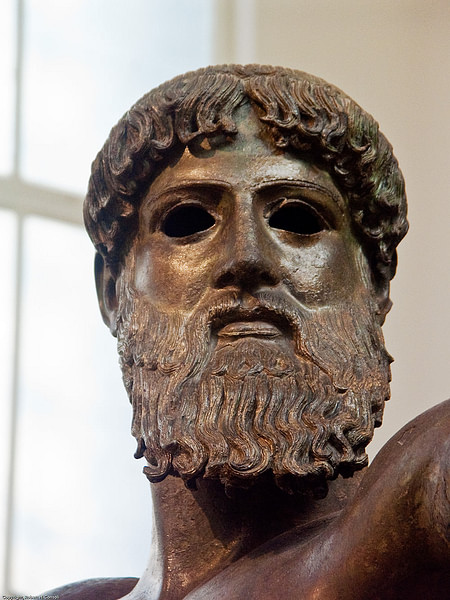
Zeus & Kronos
Finally, Hesiod comes to the birth of Zeus:
...father of gods and men
Whose thunder makes the wide earth tremble. (38)
Rhea next gave birth to Hestia, Demeter, Hera, and Hades,
who has his home beneath the earth
The god whose heart is pitiless, and him
Who crashes loudly and who shakes the earth. (38)
However, Kronos seized each child and swallowed them, except, of course, Zeus who was stolen away by his mother to be reared in secret on the island of Crete. Kronos had learned from Earth and Heaven that his destiny was to be overthrown by one of his own. He believed that no one should be superior to the gods except himself. After the future king of the gods returned from his hiding place, he would rise up against his father and castrate him. Wender wrote that Hesiod did not dwell on Zeus's attack of his father - not mentioning the castration - for he did not want the hero of the poem to demonstrate disrespect of a parent.
Atlas & Prometheus
Later, the poet introduces other notable figures of Greek mythology such as the offspring of the Titans. One of these, Atlas,
forced by hard necessity
Holds the broad heaven up, propped on his head
And tireless hands, at the ends of Earth. (39)
Next, there was the birth of the "brilliant" Prometheus. However, Prometheus had angered the mighty father of the gods. He had tried to deceive Zeus and had stolen a ray of fire and given it to humanity, but Zeus did not want them to have fire. For this deception, the great god would have his revenge, and Prometheus
was bound by Zeus
In cruel chains, unbreakable, chained round
A pillar, and Zeus roused and set on him
An eagle with long wings, which came and ate
His deathless liver. But the liver grew
Each night, until it made up the amount
The long-winged bird had eaten in the day. (40)
Hercules, son of Alcmene and Zeus, would later free Prometheus from his chains.
The First Woman
In another important, if blatantly misogynistic episode, a young woman is created. Although not named, she was dressed by Athena in silver robes and from her
comes all the race of womankind
The deadly female race and tribe of wives
Who live with mortal men and bring them harm
No help to them in dreadful poverty
But ready enough to share with them in wealth. (42)
Later Greek mythology speaks of Pandora, the wife of Epimetheus, who opens Pandora's Box, an act that brought evil to the world. However, Pandora, by name, is not mentioned until Hesiod's later work, the Works and Days. Hesiod wrote that a woman was bad for a man because she conspires. If a man avoids marriage and the difficulties it brings, he will be miserable in his old age because there will not be anyone to care for him; his relatives will divide his property upon his death. However, a married man with a good wife gets both good and bad but lives his entire life in everlasting pain.
The Battle with the Titans
Long ago, a jealous and envious Ouranos had bound three of his sons - the Giants Kottos, Gyes, and Briateus - and
made them live beneath the broad-pathed earth
And there they suffered, living underground
Farthest away, at great earth's edge; they grieved
For many years, with great pain in their hearts. (43)
However, Zeus was able to free them and a battle ensued between the Olympian gods, helped by the Giants, and the Titans. The war between the gods of Olympus and the Titans would last for ten years.
They joined in hateful battle, all of them
Both male and female. Titan gods and those
Whom Kronos sired and those whom Zeus had brought
To light from Erebos. Beneath the Earth
Strange, mighty ones, whose power was immense. (45)
The battle continued until
Zeus no longer checked his rage, for now
His heart was filled with fury, and he showed
The full range of his strength. (45)
The Titans were defeated and sent to Tartarus deep beneath the earth. Those Giants Zeus had freed and fought alongside the Olympians were rewarded for their loyalty.
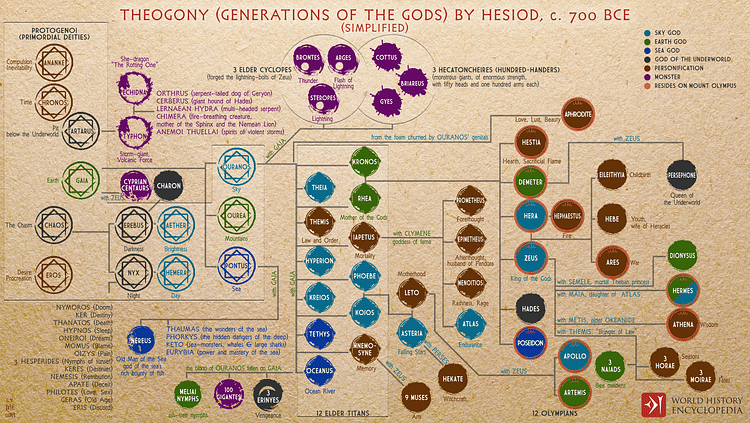
The Children of Zeus
The remainder of the poem is concerned with Zeus and the birth of his many children. His first wife was Metis, who bore him Athena. With Leto, he sired the twins Apollo and Artemis, the huntress. With Hera, his sister, Hebe, Ares, and Eileithuia were born. To Hera, "without the act of love" the limping god Hephaistos was born. From Mnemosyne came the nine Muses: Clio, Euterpe, Thalia, Melpomene, Terpsichore, Erato, Polyhymnia, Urania, and Calliope. After mentioning the many sons and daughters of Zeus's offspring Hesiod ends his poem by saying,
These are the goddesses who lay with men
And bore them children who were like the gods
Now sing of women, Muses
You sweet-voiced
Olympian daughters of aegis-bearing Zeus. (57)
